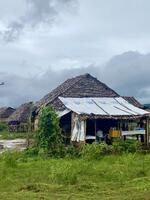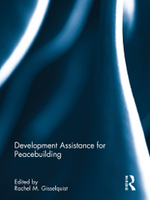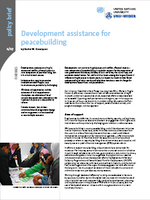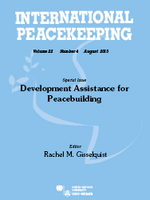Filter by...
Reset all
Publications (36)
Book Chapter
From the book:
Fragile Aid
Working Paper
pdf
The impact of conflict on taxation and development has long been debated. Most studies suggest that conflict will have a depressive effect on state tax collection, negatively impacting economic growth and development. After reviewing the existing literature, we argue for an approach that recognizes...
Working Paper
pdf
This paper critically examines the shortcomings of post-conflict reconstruction efforts in Afghanistan from 2001 to 2021, arguing that an overemphasis on measurable results and causal inference led to overly narrow, community-driven development interventions that failed to appreciate the complex...
Working Paper
pdf
Violent conflicts affect the lives and livelihoods of almost one quarter of the world’s population. But the effects of violent conflict are not uniform. This study assesses the differential effects of violent conflict on young people’s education, job prospects, and forms of civic engagement and...

Many displaced people around the world are in limbo—unable to return home or go anywhere else. Our surveys show that displaced people have lived in their current location for 6.9 years on average, significantly longer than the five-year threshold for what is typically considered a ‘protracted’...
Working Paper
pdf
– The case of Afghanistan
The aid effectiveness principles have limits if the recipient is fragile. The problem of relevance exists if the recipient has an authoritarian or totalitarian regime. In situations of weak statehood and fragility, a large portion of aid would likely bypass the state because of high demand for...
Working Paper
pdf
Community-driven reconstruction (CDR) is an approach to post-war reconstruction that gives discretion to local community councils in establishing priorities and overseeing the implementation of reconstruction and development activities. A series of methodologically exceptional studies has raised...
Working Paper
pdf
– A synthesis of three systematic reviews of aid to Afghanistan, Mali, and South Sudan, 2008–21
This working paper provides a summary of three systematic reviews on the effectiveness of aid in Afghanistan, Mali, and South Sudan between 2008 and 2021. These three countries, like all other highly fragile countries, suffer from bad governance, lack of capacity, and violence. The systematic...
Blog
The tragedy for the Afghan people of the Taliban re-taking control of the country in August 2021 is the denouement of a process 20 years in the making. The sudden collapse of the Afghan government and the national security forces over the course of a few days is not a “surprise” to anyone, but was a...
Journal Article
This peer-reviewed research is available free of charge. UNU-WIDER believes that research is a global public good and supports Open Access.
Part of Journal Special Issue
Involuntary Migration, Inequality, and Integration
Blog
– Does more education mean better futures?
Education is my freedom ... if I have my education, everything is still possible for me in the future. Mohammed grinned, and looked down at his newly acquired university student card. He’d just enrolled for his first term at university as the beneficiary of a scholarship for asylum-seeking young...
Working Paper
pdf
Unprecedented numbers of unaccompanied asylum-seeking children have arrived in Europe over the last decade, and young Afghans account for the highest proportion of unaccompanied asylum-seeking children across the UK. Despite research exploring the experiences of child refugees and asylum seekers...
Working Paper
pdf
Using 1990 5% Census and American Community Survey data, we examine the economic integration of Afghan refugees to the US, focusing on employment rates and income levels. First-wave Afghan refugees (those arriving 1980–90) have made significant income and employment gains, while poverty rates and...

– Assessing the Effects of Community-Driven Development in Afghanistan
From the book:
Development Assistance for Peacebuilding

This is an open access title available under the terms of a CC BY-NC-ND 4.0 licence. It is free to read at www.tandfebooks.com and offered as a free PDF download from Taylor & Francis Group and selected open access locations. Development assistance to fragile states and conflict-affected areas can...

Development assistance to fragile states and conflict-affected areas is a core component of peacebuilding. It includes support for the restoration of core government functions, delivery of basic services, the rule of law, and economic revitalization. Yet, while aid has been among the largest...
Journal Article
This peer-reviewed research is available free of charge. UNU-WIDER believes that research is a global public good and supports Open Access.
– Assessing the Effects of Community-Driven Development in Afghanistan
Part of Journal Special Issue
Development Assistance for Peacebuilding

Development assistance to fragile states and conflict-affected areas can be a core component of peacebuilding, providing support for the restoration of government functions, delivery of basic services, the rule of law and economic revitalization. Despite a wealth of research, however, significant...
Journal Article
– Comparative Lessons from Japan, Iraq, and Afghanistan
Part of Journal Special Issue
Aid and Institution-Building in Fragile States
Research Brief
pdf
The National Solidarity Programme (NSP) serves as a success story that has improved many Afghan lives and laid the groundwork for potential longer-term development. The NSP had a positive effect on access to drinking water and electricity, acceptance of democratic processes, perceptions of economic...
Blog
31 October 2013 Tony Addison October finds Angle in New York, for our event on ‘Fragility and Aid–What Works?’ at the Permanent Mission of Germany to the UN. Just before that we were in Copenhagen for the ReCom results meeting on ‘Challenges in Fragility and Governance’. At both meetings we met a...
Research Brief
pdf
Japan’s post-war liberalizing reforms were a success. This was partly due to the fact that US occupation preserved the strength of national institutions and made effective use of their capacity. Improvement in the scope of the state and the strength of Afghan institutions has been weak, despite the...
Blog
30 October 2013 Roger Williamson The UNU-WIDER meeting held last week in New York on the topic of fragility and aid argued forcefully that you cannot ‘fix’ failed states as you would a broken window. Drawing on over 80 papers from the governance and fragility theme of the ReCom—Research and...
Blog
30 October 2013 Carl-Gustav Lindén Despite many successful transitions towards peace and multiparty electoral systems there are still 47 fragile states and economies in the world according to the OECD. Around 1.5 billion people are affected by conflict and political instability. Most of them live on...
Working Paper
pdf
– Assessing the Effects of Community-Driven Development in Afghanistan
This paper describes the results of an impact evaluation of the National Solidarity Programme, a community-driven development programme in Afghanistan that created democratic village councils and funded small-scale development projects. Using a randomized controlled trial across 500 villages, we...
Working Paper
pdf
– a Review and Critique of Comparative Lessons
Since 2001 international attention has focused on the conflicts in Iraq and Afghanistan, and specifically on the question of whether external intervention can assist weak or fragile states in successfully making the transition to stable democracies. Despite their differences, Iraq and Afghanistan...
Research Brief
pdf
Afghanistan has received vast amounts of development aid, but results may not be sufficiently robust. There is a limited menu of acceptable options for institutional arrangements, leading to a high dependence on external resources, technical expertise, and institutional models. There is not a...
Blog
29 June 2013 Tony Addison The June-July summer issue of Angle comes to you amid the 19 hours daylight of the Finnish mid-summer. Last week UNU-WIDER’s Learning to Compete (L2C) conference on industrial policy and development in Africa was held here in Helsinki. We welcomed 200 researchers and policy...
Working Paper
pdf
– a Building Without a Foundation?
This paper argues that attempts at state-building in Afghanistan have led to institutions that are not robust. The state institutions and organizations continue to be highly dependent on external resources and technical expertise, and lack of critical mass of people able and willing to maintain them...
Working Paper
pdf
– Findings from the National Risk Vulnerability Assessment Data
The paper examines the relationship between conflict and entrepreneurial activity in Afghanistan, drawing upon a unique data set, the National Risk and Vulnerability Assessment household survey 2005. Afghanistan is severely underdeveloped and poor. Conflict has persisted in vast swathes of the...
Blog
Tommaso Ciarli, Saeed Parto and Maria Savona Afghanistan remains one of the poorest countries in the world with an estimated per capita income of 300 US dollars and average mortality age of 47 years. By all accounts, progress to date for moving Afghanistan out of poverty and on to a path of economic...
Displaying 32 of 36 results
 Join the network
Join the network